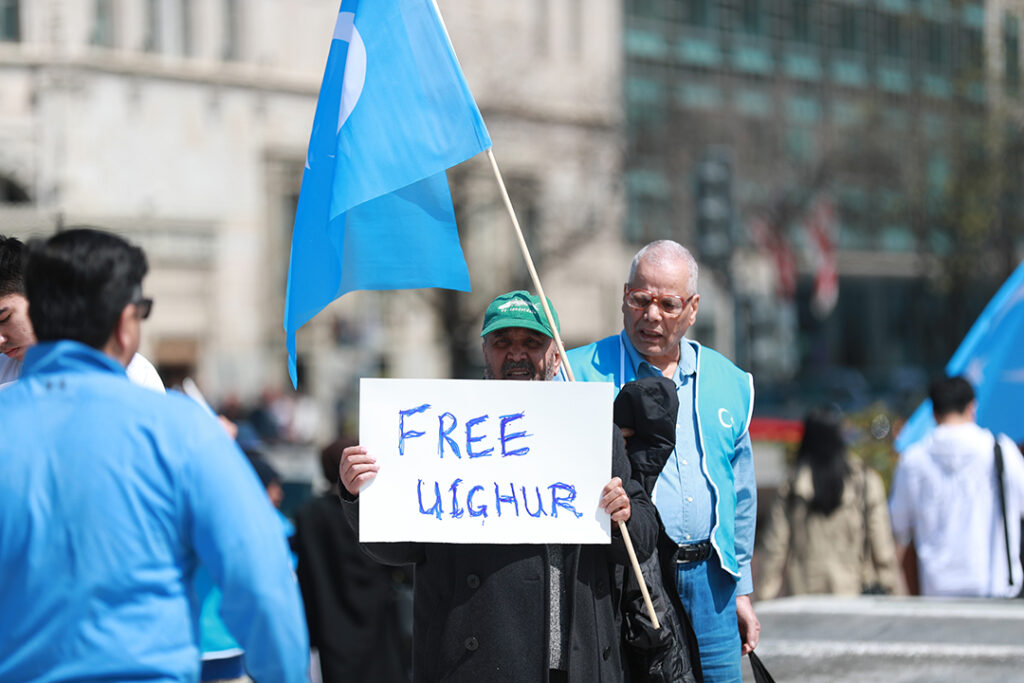Who talks about the Uighur genocide in Europe?
Who talks about the Uighur genocide in Europe?
There is growing evidence of a Uighur genocide in China. What do religious organisations do to help the Chinese Muslim minority?
This weekly comment was written by Clémence Sauty and reflects her personal analyses and opinions, rather than those of EARS.
Genocides in the 21st century
Genocides are not a thing of the past. All around the world, members of minority groups are being deported, killed, and wiped out. Rohingyas in Myanmar, Yazidis in Iraq, Banunus in the Democratic Republic of the Congo (DRC), Uighurs in China – just to name a few.[1]
The violence and threat of collective destruction imposed on marginalised ethnic-religious groups continues, even after the Holocaust. Since 1945, there have been some 13 to 28 genocides on the planet. They have claimed an estimated 18 million lives.[2]
“Never again”
By the end of the 20th century, Europeans claimed that they would “never again” tolerate or endorse such a crime.[3] With that in mind, they participated in the renewal of international law and dialogue. From its very beginning in 1946, the United Nations recognised genocide as a crime.[4] Later, Europeans learned from the 1994 slaughter of Tutsis in Rwanda that genocide must be nipped in the bud.[5]
And the EU is not idle in the face of foreseen genocides all around the world. In September 2022, the European Commission proposed a regulation banning products made through forced labour from the European market. If this regulation was adopted by the European Parliament, it would lower the demand for Chinese products that involve the abuse of Uighurs’ work.[6] This measure does not, however, bar Chinese authorities from deporting, enslaving, and killing Uighurs. At most, it signals that Europeans do not wish to be compromised in one way or the other.
Religious solidarity in the face of hatred
Admittedly, the victimised groups are rarely actively and unanimously supported by the international community. But those groups only rarely are identified through the lens of nationality and ethnicity. Often, they also are religious minorities. For instance, Rohingyas and Uighurs are Sunni Muslims.[7] [8]
Analyst Nicolas Kazarian says that their oppression is twofold: “On the one hand, there is a phenomenon that is not related to Islam, but to the minority status of Islam in these countries. Minorities are used as scapegoats and pretence for geopolitical destabilisation. On the other hand, the oppression of Muslim minorities is part of a greater trend that is currently known as Islamophobia.”[9]
Islamophobia being “a global epidemic” according to the United Nations, there is a chance anyone could relate to the extreme violence that is imposed on Muslim minority groups, whether in China or Myanmar. More broadly, religious institutions and communities could stand in solidarity with ethnic-religious groups that are threatened with destruction.
“Divide and rule”
Once again however, religious organisations provide little support. In the case of Uighurs, the lack of support is because the Muslim world is diverse and pursues diverse interests.[10] [11] Saudi Arabia, for example, is an Islamic State. Yet, its government collaborates with China. In 2019 and 2020, Saudi officials endorsed China’s policy towards Uighurs in two letters to the United Nations. More importantly, Saudi Arabia has turned several Uighur refugees over to China.[12]
Other Arab countries, like Egypt, are also complicit in the extermination of Uighurs. In 2017 already, the Egyptian police collected over 200 Uighurs, who were students at the al-Azhar University, an Islamic university in Cairo.[13]
In this context, it is clear that there can be no unanimous Muslim support for Uighurs. Nevertheless, the Turkish government stands by the Uighurs. In 2022, on the occasion of an assembly of the Organisation of Islamic Cooperation, the country’s Minister of Foreign Affairs urged China’s Muslim allies to “remember their duties and responsibilities towards the Muslim world.”[14]
Survivors pleading in the name of faith
That is not to say that nothing is done. Uighur organisations, first and foremost, are working to be heard. In 2019, the president of the European Uighur Institute famously addressed her fellow Muslims around the world: “I am sorry, but I do not wish you a good Ramadan. While millions of Uighurs and other Muslims suffer and die in Chinese concentration camps … where Chinese authorities force Muslims to eat pork, drink alcohol, and disavow their religion, I cannot wish you a good Ramadan.”[15]
The World Uyghur Congress and the Campaign for Uyghurs also strive to connect with potential allies through religion. As part of the Campaign, human rights activist Rushan Abbas stated that: “Muslim leaders must defend their faith by standing up to all injustice, all oppression and all tyranny as taught by the Prophet Muhammad, peace be upon him.”[16]
In Europe too, Muslim leaders take an interest in the situation of Uighurs, although mostly on an individual level. In France, for example, the main Muslim federation has not officially reacted to the oppression of Uighurs. However, some musicians, actors, and imams who are renowned Muslim figures have publicly shared their deep concerns for the attacked community.[17] Many were mobilised in the 2020 #FreeUyghurs Twitter movement.[18]
Growing interfaith awareness
Still, the stakes are too high for individuals and victims to be able to make a difference on their own. Religious and political organisations need to step up if the international community is to put an end to the genocide of Uighurs and other ethnic-religious minorities.
On that matter, interfaith awareness could be an effective lever for action. At least, one can hope so, after Cardinal Aveline mentioned the fate of Uighurs and Rohingyas in his December 2022 prayer for peace.[19] What more will other religious leaders do to alleviate the suffering of their fellow people of faith?
This weekly comment was written by Clémence Sauty and reflects her personal analyses and opinions, rather than those of EARS.
To all weekly comments -> Interested in similar topics? Go to our Dashboard and receive free updates.
Sources
[2] Genocide 101: What is Genocide? | Stop Genocide Now
[3] Europe said ‘never again.’ Why is it silent on Uighur genocide? – POLITICO
[4] United Nations Office on Genocide Prevention and the Responsibility to Protect
[5] Genocide 102: The 8 Stages of Genocide | Stop Genocide Now
[6] L’Union européenne propose de bannir les produits issus du travail forcé
[7] Muslim groups in China – Wikipedia
[8] Rohingya people – Wikipedia
[9] Rohingyas, Ouïghours… : la carte des musulmans persécutés dans le monde
[10] The Uyghurs: The Forgotten Muslims
[11] Répression des Ouïghours : neuf pays arabes soutiennent la Chine | Middle East Eye édition française
[12] The Arab World Isn’t Just Silent on China’s Crackdown on Uighurs. It’s Complicit
[13] The Arab World Isn’t Just Silent on China’s Crackdown on Uighurs. It’s Complicit
[14] Turkish Minister of Foreign Affairs, Mevlut Cavusoglu, declared: “We do not expect you to waste the good relations you have with China. But you should you these good relations to improve the living situation of the Uighur community.” See more: Au sommet de l’OCI, le silence assourdissant des pays musulmans face à la Chine étrangle les Ouïghours
[15] TRIBUNE. « Monde musulman, je ne vous souhaite pas un bon ramadan »
[16] Au sommet de l’OCI, le silence assourdissant des pays musulmans face à la Chine étrangle les Ouïghours
[17] The Uyghurs: The Forgotten Muslims
[18] Mouvement de soutien #FreeUyghurs sur les réseaux sociaux
[19] Le cardinal Aveline dénonce «le cynisme effrayant» de la Russie en Ukraine






